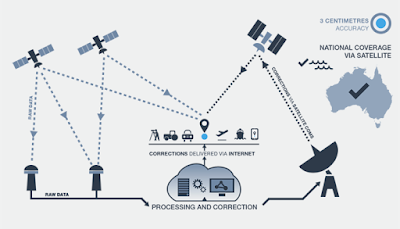16 Februari 2017
GMV, Inmarsat and Lockheed Martin have joined Australia's national positioning project (image : Spatial Source)
Geoscience Australia announced today that technology companies GMV, Inmarsat and Lockheed Martin have joined Australia's two-year national positioning project.
Geoscience Australia's Gary Johnston said that the project is trialling a Satellite Based Augmentation System (SBAS) to improve the accuracy of Australia's positioning.
"The SBAS test-bed is Australia's first exploratory step to joining countries such as the United States, Europe, China, Russia, India and Japan, which are already using the technology on a daily basis.
"This technology hasn't been widely tested in Australia before, however GMV, Inmarsat and Lockheed Martin have experience implementing it around the world.
Satellite positioning services such as GPS provide accuracy to within 5 metres which is suitable for some, but not all applications. (image : Geoscience Australia)
"The testing of SBAS technology in Australia offers a number of potential safety, productivity, efficiency and environmental benefits to many local industries, including transport, agriculture, construction, and resources.
"Research has shown that the wide-spread adoption of improved positioning technology has the potential to generate upwards of $73 billion of value to Australia by 2030," Mr Johnston said.
In January 2017, the Australian Government announced $12 million in funding for the trial of SBAS technology.
Mr Johnston said Geoscience Australia along with the Australia and New Zealand Cooperative Research Centre for Spatial Information (CRCSI) are responsible for the implementation and oversight of the project on behalf of the Australian Government, but will be collaborating closely with GMV, Inmarsat and Lockheed Martin on the technical components of the test-bed.
Satellite delivery will ensure that accurate positioning information can be received by the user directly via satellites, anytime and anywhere within Australia. (image : Geoscience Australia)
"We'll be testing two new satellite positioning technologies - next generation SBAS and Precise Point Positioning - which provide positioning accuracies of several decimetres and five centimetres respectively."
Australia currently relies on the Global Navigation Satellite Systems (GNSS) of other countries including the United States' Global Positioning System (GPS). These international systems typically give Australians positioning accuracy of five to 10 metres.
In March, Geoscience Australia and the CRCSI will call for organisations from a number of industries including agriculture, aviation, construction, mining, maritime, road, spatial, and utilities to participate in the test-bed.
(Geoscience Australia)
Langganan:
Posting Komentar (Atom)














Indonesia have to get these too
BalasHapus